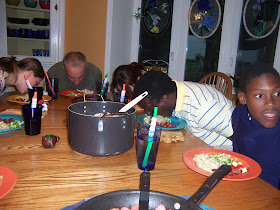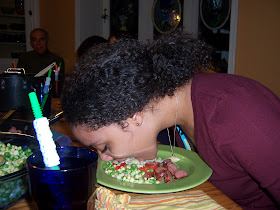My calculus students are getting ready for their first midterm, and for some reason this makes me think of what it's like to take on a life of new frugality. It's a bit daunting (in the calculus realm) to face that first exam, or (in the frugality realm) to think about "giving up" things you've gotten used to.
As my students study, here is the first and most important piece of advice I give them:
And isn't that true of so many things? Watching Michael Jordan won't teach you how to do a lay-up: doing lay-ups teaches you how to do lay-ups. Reading about yard sales or bulk purchasing won't save you money; actually trying yard sales or doing a few bulk purchases will save you money. Well, it ought to save you money eventually. Although you'll probably make a few mistakes at first. But it's not until you try it that you learn how the system really works for you.
Which leads me to the other piece of advice I try to share with my students (although not this bluntly)
I hope my students won't fail their exam (although I know that some of them will). But in class and on homework, they're going to make mistakes, and the best students are willing (even eager) to do so. They make stupid guesses, see whether those guesses work, and learn something from what goes wrong. They do this so easily, they don't think of the wrong guesses as "failing". But the weak students stare at a blank piece of paper, unwilling to write anything down for fear of writing something incorrect.
And this, this is true for so many parts of life. I've had so many people tell me they can't make bread; a few say that they tried and it bombed. I could tell you my own failed-bread stories about orange juice bread (yucko), about the no-yeast failures, about the salt/sugar mix-ups in my own life. And yet, somehow, I mostly got through this. Bad bread is a learning experience: the sugar and salt are now VERY well labeled. Bt nowadays when my family finds out I'm making bread, there's a minor celebration. The mistakes were definitely worth the jumping-hugging-praising routine I get to go through now.
One of the joys of being frugal is that mistakes are often not very costly. This summer, I tried a homemade dishwasher detergent; it left a film on all our plates and glasses. For that little lesson, I'm out 45¢ worth of borax, washing soda, and salt. A few weeks ago, I bought a pair of yard-sale pants that I later discovered my son had just barely grown out of: another 25¢ down the drain. It's hard to think of those as "failure", but those are the kinds of stories that can keep a novice from even trying frugal strategies.
On paper, I'm teaching my students about the slope of the tangent line, but in reality, what I'm hoping they learn is so much bigger. I want them to bang their head against new ideas, to play with their own mistakes, to practice doing what they can't yet do. And I want them to come out the other side, experts on some simple math thing (yes! they can factor a quadratic!), ready to make new and bigger mistakes at higher and higher levels.
As my students study, here is the first and most important piece of advice I give them:
 |
| Do NOT read the book! |
Whenever I have a student fail a test and come talk to me about it, he always said he studied by reading the book. But math isn't about reading and understanding what someone else wrote, it's about actually solving problems. So don't read the book; instead, solve problems. Do the same problem over and over again, until it's easy for you. Practice doing the math, not reading the math.
Here's another way to bomb the test. Do the homework problem; get it wrong; look up the answer in the back of the book; say, "oh, I understand now!", and then move on. The big mistake comes in that last step -- the moving on to a new problem. Instead of looking for new problems, grab a sheet of blank paper and start over. Do that darned problem again (and again) until it's easy to get it right. Make sure you can do it yourself, not just appreciate how the book or your roommate did it.
And isn't that true of so many things? Watching Michael Jordan won't teach you how to do a lay-up: doing lay-ups teaches you how to do lay-ups. Reading about yard sales or bulk purchasing won't save you money; actually trying yard sales or doing a few bulk purchases will save you money. Well, it ought to save you money eventually. Although you'll probably make a few mistakes at first. But it's not until you try it that you learn how the system really works for you.
Which leads me to the other piece of advice I try to share with my students (although not this bluntly)
 |
| Prepare to fail. |
And this, this is true for so many parts of life. I've had so many people tell me they can't make bread; a few say that they tried and it bombed. I could tell you my own failed-bread stories about orange juice bread (yucko), about the no-yeast failures, about the salt/sugar mix-ups in my own life. And yet, somehow, I mostly got through this. Bad bread is a learning experience: the sugar and salt are now VERY well labeled. Bt nowadays when my family finds out I'm making bread, there's a minor celebration. The mistakes were definitely worth the jumping-hugging-praising routine I get to go through now.
One of the joys of being frugal is that mistakes are often not very costly. This summer, I tried a homemade dishwasher detergent; it left a film on all our plates and glasses. For that little lesson, I'm out 45¢ worth of borax, washing soda, and salt. A few weeks ago, I bought a pair of yard-sale pants that I later discovered my son had just barely grown out of: another 25¢ down the drain. It's hard to think of those as "failure", but those are the kinds of stories that can keep a novice from even trying frugal strategies.
On paper, I'm teaching my students about the slope of the tangent line, but in reality, what I'm hoping they learn is so much bigger. I want them to bang their head against new ideas, to play with their own mistakes, to practice doing what they can't yet do. And I want them to come out the other side, experts on some simple math thing (yes! they can factor a quadratic!), ready to make new and bigger mistakes at higher and higher levels.
















































